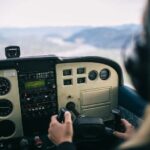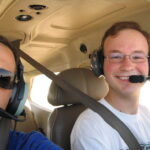Your Flight Plan to Success: FAA Commercial Pilot Exam Prep
Embarking on the journey to become a commercial pilot is thrilling. You’re about to enter a world where the sky is literally the limit. But before you can soar, you’ve got to pass the FAA Commercial Pilot Training Exam. It’s a big hurdle, but with the right strategy, you can clear it with room to spare. Let’s chart your course to ace that test!
Article-at-a-Glance: Navigating Your Study Journey
- Understand the structure and requirements of the FAA Commercial Pilot Exam.
- Identify key areas to focus on for effective studying.
- Learn how to prepare both mentally and with the right study materials.
- Discover the best online resources and practice tests to sharpen your knowledge.
- Get practical tips for what to do on the day of the exam to ensure success.
The Fundamentals of the FAA Commercial Pilot Exam
Before we dive into the study tips, let’s get a clear picture of what the FAA Commercial Pilot Exam is all about. This exam is the gateway to your commercial pilot license, and it tests your knowledge on a wide range of topics, from weather patterns to flight regulations. It’s a multiple-choice test, and you’ll need a score of 70% or higher to pass. But don’t sweat it, I’m here to help you aim much higher than the bare minimum.
Acing the Basics: What to Focus on
Now, to tackle this beast, you’ve got to know what to study. The exam covers a lot of ground, but some areas are more critical than others. Focus on aerodynamics, aircraft systems, emergency procedures, navigation, and weather. These are the big-ticket items that will form the backbone of your pilot knowledge and are frequently tested on the exam.
Setting the Stage: Preparing Your Mind and Materials
Alright, you know what you’re up against. It’s time to get your head in the game. Preparing for this exam is as much about mental readiness as it is about knowing the material. You’ve got to believe you can do this—confidence is key. And remember, this isn’t about cramming; it’s about understanding. You’re training to be a pilot, not just to pass a test.
Gathering Your Study Arsenal
When it comes to materials, you want the best tools for the job. Start with the FAA’s own publications—they’re the gold standard and they’re what the test is based on. You’ll want the Pilot’s Handbook of Aeronautical Knowledge and the Aeronautical Information Manual at your fingertips. Then, supplement with online courses, apps, and practice tests. Here’s a quick list to get you started:
- FAA’s Pilot’s Handbook of Aeronautical Knowledge
- FAA’s Aeronautical Information Manual
- Thrust Flight’s Online Ground Schools
- King Schools Written Test Prep
- Sporty’s Pilot Shop Study Materials
- Sheppard Air for test prep software
- ASA’s Prepware Online for practice exams
- FAA Safety Team’s online learning courses
Remember, the more variety in your study materials, the better prepared you’ll be. Mix reading with interactive tools to keep things fresh and engaging. And don’t forget to use those practice tests—they’re like gold when it comes to getting you test-ready.
Mental Preparation: Developing the Right Mindset
Believe it or not, your mindset can be as crucial as your knowledge when it comes to acing the FAA Commercial Pilot Exam. It’s normal to feel a bit anxious, but let’s turn that energy into something positive. Start by setting realistic goals for your study sessions and visualize yourself succeeding. Remember, every pilot before you has been right where you are, and they’ve made it through. You will too!
Decoding the Exam: Structure and Content Breakdown
Let’s break down the beast. The FAA Commercial Pilot Exam is made up of 100 multiple-choice questions. You’ll have three hours to complete it, which means pacing yourself is key. The questions are pulled from a huge database, so every test is a bit different. That’s why a broad understanding of the material, rather than rote memorization, is your best strategy.
Understanding the Question Types
You’ll encounter three main types of questions on the exam: recall, application, and analysis. Recall questions test your memory of facts. Application questions ask you to apply knowledge to a specific scenario. Analysis questions are the trickiest; they require you to interpret data or solve more complex problems. Practice each type so you’re ready for anything.
Key Topics for the Commercial Pilot Exam
Now, let’s focus on the key topics that you’ll need to master. These include advanced aerodynamics, aircraft systems, flight instruments, navigation, regulations, and weather. Each topic is a critical piece of the puzzle in commercial aviation. Understanding these areas deeply will not only help you pass the exam but also be a competent and safe pilot.
Study Strategies: Tailoring Your Approach
No two pilots are the same, and your study strategy should reflect your unique learning style. Some folks do best with flashcards; others need to draw diagrams or write things out. Find what works for you and stick with it. And mix it up with different types of materials to cover all your bases. The key is consistent, focused study sessions that leave you feeling confident and prepared.
Time Management Techniques for Effective Study
Time is your ally if you use it wisely. Break your study time into focused intervals—say, 25 minutes of study followed by a 5-minute break. This method, known as the Pomodoro Technique, can help prevent burnout and keep your mind fresh. And don’t forget to schedule longer breaks every few hours. Consistent, daily study beats marathon cram sessions every time.
Using Online Resources and Apps
In today’s digital age, online resources and apps are invaluable tools in your study arsenal. They offer interactive experiences and can adapt to your personal learning pace. Start with the FAA’s own resources—they’re authoritative and free. Then, explore apps that offer flashcards, practice questions, and progress tracking. Some popular ones include Prepware Aviation Maintenance Technician, ASA’s Prepware Online, and the E6B Aviation Calculator app for flight planning practice.
- FAA Safety Team’s online learning courses for official guidelines
- Prepware Aviation Maintenance Technician for comprehensive practice
- ASA’s Prepware Online for a variety of practice exams
- E6B Aviation Calculator app for on-the-go calculations
- Quizlet for creating and sharing custom flashcards
- ForeFlight for navigation and weather planning practice
These tools can help reinforce what you’ve learned in a dynamic way, making study time more engaging and effective. Plus, many apps allow you to study on the go, turning downtime into productive review sessions.
Practice Tests: Your Secret Weapon
One of the most effective ways to prepare for the FAA Commercial Pilot Exam is to take practice tests. They help you familiarize yourself with the format of the exam, the types of questions you’ll face, and the pressure of working against the clock. Most importantly, they highlight areas where you need further study. Make sure to review the explanations for each question, not just the correct answers. This will deepen your understanding and help you remember the material better.
After each practice test, take the time to go over any mistakes and understand why you got them wrong. This reflection is where the real learning happens. It’s not just about getting questions right; it’s about building a solid foundation of knowledge that you can draw upon in any flying situation.
Navigating Online Training Options
With a multitude of online training options available, choosing the right one can feel overwhelming. Look for courses that are comprehensive and structured in a way that fits your learning style. Some courses are video-based, while others might be text-heavy or interactive. Check if the course offers progress tracking and personalized feedback, as these features can greatly enhance your learning experience.
Also, consider the credibility of the course provider. Look for reviews from past students, check their pass rates, and see if they’re recognized by aviation authorities. A well-regarded course can make all the difference in your preparation.
Choosing the Right Online Training Course
When selecting an online training course, consider the following:
- Content coverage: Does it cover all the topics you’ll need to know for the exam?
- Learning format: Is it videos, interactive modules, text, or a combination?
- Feedback system: Can you track your progress and identify areas for improvement?
- Access duration: How long can you access the materials? Is there a time limit?
- Cost: Does the price fit your budget, and does it reflect the value of the course?
- Reputation: What do other students say about the course’s effectiveness?
- Support: Is there expert help or peer support available if you have questions?
Remember, the cheapest option isn’t always the best. Invest in a course that will give you a strong return on investment—namely, passing the exam with confidence.
Interactive Learning vs. Self-Study: Weighing the Pros and Cons
Interactive learning can be a game-changer. It often includes live instruction, immediate feedback, and the ability to ask questions in real-time. This can be especially beneficial if you’re someone who thrives on engagement and accountability. However, it can be more expensive and less flexible in terms of scheduling.
Self-study, on the other hand, offers complete flexibility. You can learn at your own pace, on your own schedule. It’s typically more affordable and allows you to tailor your study plan to your specific needs. The downside is that it requires a high level of self-discipline and motivation to stay on track.
Consider your learning preferences, budget, and schedule when deciding between these two approaches. Many students find a hybrid approach that combines both methods works best for them.
Taking the Control: Tips for Test Day
Test day is when your preparation takes flight. Start by ensuring a good night’s sleep and a nutritious breakfast. Arrive at the testing center early to avoid any last-minute stress. Bring all necessary identification and authorization documents, and remember to pack a simple calculator, as some questions may require basic calculations.
During the exam, read each question carefully and manage your time wisely. If you’re stuck on a question, don’t panic—mark it and move on. You can always return to it later. Trust your preparation and stay calm. You’ve put in the work; now it’s time to let it show.
- Get plenty of rest the night before.
- Eat a healthy breakfast to fuel your brain.
- Arrive early to reduce stress.
- Bring all required documentation and materials.
- Read questions thoroughly and manage your time effectively.
- Mark difficult questions and revisit them if time allows.
- Stay calm and confident—you’re ready for this!
Remember, the test is just one step in your journey to becoming a commercial pilot. With the right preparation and mindset, you’ll be ready to take to the skies in no time.
Checklist for Your Exam Day
It’s the big day, and being prepared is half the battle won. Here’s a checklist to ensure you’ve got everything covered:
- Official identification (driver’s license, passport, etc.)
- FAA exam authorization or endorsement from your instructor
- Simple, non-programmable calculator (check the allowed models)
- Extra pens and pencils
- A watch or small clock (no smartwatches)
- Snacks and water for breaks
- Confirmation of exam appointment and location
- Layers of clothing to adjust for room temperature
- A confident and positive mindset
Double-check this list the night before to avoid any morning-of panic. Being prepared with all the right tools and documents will set the stage for a smooth exam experience.
Last-Minute Warm-Up: Do’s and Don’ts
In the final hours before your exam, it’s crucial to keep your cool. Here are some do’s and don’ts to help you stay focused:
- Do: Review key formulas and concepts.
- Do: Skim through your notes or flashcards.
- Do: Visualize the process of taking the exam and succeeding.
- Do: Take deep breaths and maintain a calm demeanor.
- Don’t: Cram new information – it can overwhelm you.
- Don’t: Stay up late studying – rest is more beneficial now.
- Don’t: Skip meals or rely on just caffeine – your brain needs fuel.
- Don’t: Focus on what could go wrong – stay positive!
Remember, you’ve prepared for this. Trust in your hard work, and let your knowledge lead the way.
After the Exam: Next Steps in Your Aviation Career
Once the exam is over, take a moment to breathe and relax. But remember, this is just one milestone on your journey to becoming a commercial pilot. Whether you aced the test or didn’t perform as well as you hoped, there are clear next steps to take.
Interpreting Your Scores
When you get your results, it’s important to understand what they mean. A passing score is a cause for celebration, but don’t just stop there. Look at the areas where you scored lower and consider revisiting those topics. This isn’t just about passing an exam; it’s about being the best pilot you can be. If you didn’t pass, don’t get discouraged. Use the score report to guide your studies and come back stronger.
Building Hours and Gaining Experience
With the written exam out of the way, it’s time to focus on building flight hours and gaining practical experience. Here’s how:
- Log as many flight hours as possible; you’ll need them for your license.
- Seek out diverse flying experiences to broaden your skills.
- Consider a flight instructor role; it’s a great way to earn hours and refine your knowledge.
- Network with other pilots and aviation professionals.
- Stay current with continuing education and industry news.
- Always fly with safety as your top priority.
Each hour you spend in the air is an investment in your future as a commercial pilot. Embrace every opportunity to learn and grow.
FAQ: Your Top Questions Answered
Let’s tackle some of the most common questions that come up during the FAA Commercial Pilot Exam preparation process.
How long does it typically take to study for the FAA Commercial Pilot Exam?
On average, expect to spend 2-3 months preparing for the exam if you study consistently for a few hours each day. However, this can vary based on your background knowledge, learning pace, and available study time.
Can I take the exam multiple times if I don’t pass on my first attempt?
Yes, you can retake the exam after a 14-day waiting period. Use this time to strengthen your understanding of the material, particularly in the areas where you struggled.
Are there any online courses that you recommend for exam preparation?
While there are many great options out there, it’s important to choose a course that fits your learning style and needs. Courses from King Schools, Sporty’s Pilot Shop, and the FAA Safety Team are widely respected.
- King Schools offers comprehensive video courses.
- Sporty’s Pilot Shop provides a variety of study aids and practice tests.
- The FAA Safety Team has online learning courses that align with FAA standards.
What materials are allowed during the exam?
You can bring:
- A simple, non-programmable calculator
- FAA-approved testing supplements and charts
- Writing utensils and scratch paper (provided by the testing center)
Electronic devices, such as phones and smartwatches, are not permitted.
How does the online exam process work and how is it different from the in-person exams?
The online exam process is similar to in-person exams, with the main difference being the location. You’ll still be monitored, typically through a webcam, and the rules and regulations remain the same. Ensure you have a reliable internet connection and a quiet, distraction-free environment.
Whether online or in-person, the goal is the same: to assess your knowledge and readiness to become a commercial pilot. Approach both formats with the same level of seriousness and preparation.
How long does it typically take to study for the FAA Commercial Pilot Exam?
Time is a pilot’s trusty companion, and when it comes to studying for the FAA Commercial Pilot Exam, it’s all about how you use it. Most aspiring pilots find themselves comfortable after 2-3 months of diligent study. That’s with a few hours of study each day, mind you. But remember, this isn’t a race. Some may need more time, and that’s perfectly okay. The goal is to understand the material thoroughly, not just to cross the finish line.
Can I take the exam multiple times if I don’t pass on my first attempt?
Everyone wants a smooth takeoff, but sometimes, turbulence happens. If you don’t pass the exam on your first try, it’s not the end of your pilot dreams. You can retake the exam after a 14-day period. Use this time wisely; review the areas that tripped you up and come back with a stronger understanding. There’s no limit to the number of times you can take the test, so don’t let one rough flight discourage you from reaching for the skies.
Are there any online courses that you recommend for exam preparation?
With a sky full of online courses, it can be hard to pick the right star to navigate by. I’ve seen many students soar after using King Schools’ courses for their comprehensive video lessons. Sporty’s Pilot Shop also offers a suite of tools that cater to different learning styles. And don’t overlook the FAA Safety Team’s courses—they’re tailored to meet FAA standards and can give you that official edge in your studies.
What materials are allowed during the exam?
When it’s time to sit for the exam, you won’t be going in empty-handed. You can bring a basic, non-programmable calculator to help you with those pesky calculations. The FAA will also provide you with testing supplements and charts that are fair game during the test. And of course, you’ll have writing utensils and scratch paper for working out problems. Just remember, personal electronics are a no-go, so leave your smartphone and smartwatch behind.
How does the online exam process work and how is it different from the in-person exams?
Taking the exam online is like flying with autopilot; it’s the same destination, just a different feel. You’ll be monitored through a webcam to ensure everything’s on the up-and-up. The questions, time limits, and rules are the same as the in-person exam. The biggest difference? You’ll need a reliable internet connection and a quiet spot where you can focus without interruptions. Treat it with the same respect as an in-person exam, and you’ll do just fine.
As we taxi to the end of our journey, remember that passing the FAA Commercial Pilot Exam is a significant milestone on your path to the skies. It’s a challenge, sure, but it’s also an opportunity to prove to yourself—and the world—that you have what it takes to be a commercial pilot. With the right preparation, mindset, and resources, you’ll not only pass the exam but also pave the way for a successful aviation career.
Keep your eyes on the horizon and your hands steady on the controls. Your dreams of flight are closer than you think. Happy studying, and blue skies ahead!
Frequently Asked Questions
Still have questions? Here are some additional answers to help you navigate the final approach to your exam prep.
- Is there a limit to the number of times I can retake the FAA exam?
No, there’s no limit. Just wait the required 14 days before retesting. - What’s the best way to study for the oral portion of the exam?
Practice with a study buddy or instructor, and review common questions and scenarios. - Can I use my notes during the online exam?
No, notes are not permitted during the exam, whether online or in-person. - How much does the exam cost?
Costs vary by location and provider, so check with your testing center. - What should I do if I’m struggling with a particular topic?
Seek extra help from an instructor or online resources, and don’t be afraid to ask questions.
Now, with all your questions answered and your knowledge sharp, you’re ready to take on the FAA Commercial Pilot Exam. Go forth with confidence, and remember that every pilot’s journey is unique. Your determination and passion for flying will guide you through, and soon, you’ll be charting your own course in the skies. Good luck!







Leave a Reply